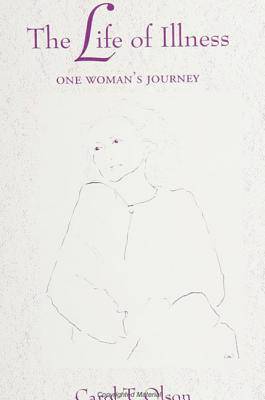
Wil je zeker zijn dat je cadeautjes op tijd onder de kerstboom liggen? Onze winkels ontvangen jou met open armen. Nu met extra openingsuren op zondag!
- Afhalen na 1 uur in een winkel met voorraad
- Gratis thuislevering in België vanaf € 30
- Ruim aanbod met 7 miljoen producten
Wil je zeker zijn dat je cadeautjes op tijd onder de kerstboom liggen? Onze winkels ontvangen jou met open armen. Nu met extra openingsuren op zondag!
- Afhalen na 1 uur in een winkel met voorraad
- Gratis thuislevering in België vanaf € 30
- Ruim aanbod met 7 miljoen producten
Zoeken
Omschrijving
The Life of Illness tells the story of one woman's courageous struggle with kidney failure, illness, and death. It is, however, a book about life, hope, faith, and the transformative power of caring for one another. Carol Olson writes "from the heart of experience," having shared a life of illness with two brothers and three sisters, whom she now survives. Her own life has been precariously maintained by kidney dialysis for more than twenty years. Inspired by the works of philosophers, literary authors, and poets, Olson turns to hermeneutical phenomenology to explore the meaning of the experience of illness. In response to the question, "How can we live with illness?" the author engages in reflective conversations. As patient, she dialogues with literary works of art dealing with illness, developing relationships between texts and others who experience illness from various points of view: the chaplain, the doctor, the nurse, and the parent. Olson makes us aware of the significance of others in their various caring relations with the person of illness. The clarity and deeply compelling nature of her writing makes this book accessible to all whose lives have been touched by these experiences. The experience of illness and death we all face impels us to wonder with her about the nature of wholeness and health. Ultimately we ask: "What is life?"
Specificaties
Betrokkenen
- Auteur(s):
- Uitgeverij:
Inhoud
- Aantal bladzijden:
- 203
- Taal:
- Engels
- Reeks:
Eigenschappen
- Productcode (EAN):
- 9780791411995
- Verschijningsdatum:
- 18/12/1992
- Uitvoering:
- Hardcover
- Formaat:
- Genaaid
- Gewicht:
- 471 g

Alleen bij Standaard Boekhandel
+ 290 punten op je klantenkaart van Standaard Boekhandel
Beoordelingen
We publiceren alleen reviews die voldoen aan de voorwaarden voor reviews. Bekijk onze voorwaarden voor reviews.











